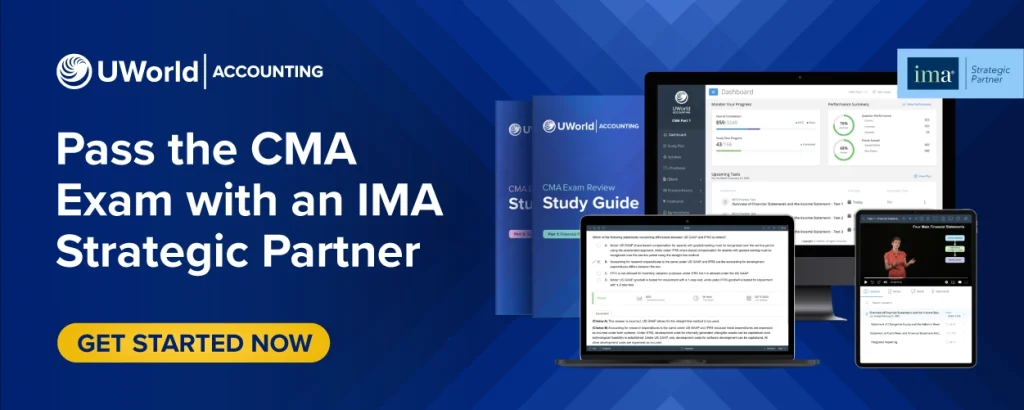A Certified Management Accountant (CMA®) leverages their accounting and financial management skills to make informed business decisions. They work closely with executive teams and strategically influence an organization’s financial outlook. From starting as a financial analyst to becoming a chief financial officer (CFO), the career possibilities across accounting and finance are endless for CMAs.
Here’s how a CMA contributes to business success:
- Conducting business audits, risk assessments, and cost analysis
- Formulating financial strategies for businesses using data-driven insights
- Advising managers and board members on the impact of financial decisions
- Analyzing financial data to drive business strategies
A CMA goes beyond traditional number crunching and acts as the storyteller of these numbers by projecting the impact of business decisions. Due to their widened skillset and expertise in a range of finance and accounting principles, CMAs pursue careers in various industries across both public and private sectors—they are not limited to working in the typical accounting firm environment.
Career Benefits of Pursuing the CMA®
The CMA is an in-demand career path that places you miles ahead of your peers. There are numerous benefits to pursuing CMA certification.
- Career growth: CMAs are in high demand in various industries due to their multi-faceted skills in managerial accounting. They liaise closely with top management and typically hold leadership roles, including CFO and Vice President of Finance.
- Global recognition and network: CMA is a fast-growing global certification that equips managerial accountants with the skills to make effective business and financial decisions. By joining a 140,000+ community, CMAs contribute to every industry and take on specialized roles.
- Higher salary: According to the most recent Institute of Management Accountants (IMA®) Global Salary Survey, CMAs earn 21% more in median total compensation than their non-certified peers globally. The CMA credential enables you to negotiate higher salaries with employers.
- Specialized skills: With advanced skills in financial planning, accounting management, and analytics, CMAs provide the best of business and finance acumen. You’re equipped to take on challenging roles and be the go-to for financial decisions.
CMA Career Specialties
CMAs are versatile leaders in management accounting and may choose to specialize in certain areas. From financial planning and analysis (FP&A) to cost management and corporate finance, CMAs may choose to either rise in the ranks in those positions or switch from one specialty to another.
Financial Planning and Analysis (FP&A)
Cost Management and Analysis
Corporate Finance
Risk Management
Accounting Management and Reporting
Financial Planning and Analysis (FP&A)
- Financial Analyst
- FP&A Manager
- Chief Financial Officer (CFO)
Cost Management and Analysis
- Cost Accountant
- Cost Analyst
- Cost Manager
Corporate Finance
through various strategic interventions. The main components of corporate finance are budgeting, financing, and
management.
- Corporate Financial Analyst
- VP of Finance
- Director of Corporate Finance
Risk Management
decisions. From acquisitions and investments to mergers, they hold the key to decision-making.
- Risk Management Specialist
- Audit Manager
- Chief Risk Officer
Accounting Management and Reporting
- Corporate Controller
- Management Accountant
- Director of Accounting
CMA Jobs
CMAs are in high demand across various industries, including information technology (IT), healthcare, education, and beyond. Let’s explore the CMA career path from entry level to top management.
Entry Level CMA Jobs
Most CMA candidates begin their careers as financial analysts, cost accountants, or staff accountants and rise through the ranks.
This role is all about analysis and forecasting, where you study the market trends and factors to make smart financial decisions for a company. Top responsibilities may include:
- Analyzing current and past financial data and performance
- Preparing reports and projects based on the analysis
- Exploring investment opportunities and identifying trends
As a cost accountant, you’d formulate strategies to minimize costs and maximize profits by analyzing a business's performance. CMAs are highly sought after for this role due to their expertise in cost accounting and analysis. Top responsibilities may include:
- Designing and implementing cost accounting systems
- Analyzing different types of costs and recommending changes
- Developing cost standards for materials, supervising costs, and managing accounting staff
Middle Management CMA Jobs
After about 2 years of experience, you can climb to a middle management position. These roles require specialized skills and work closely with the leadership group.
CMAs in this role focus on translating financial data into insights for a company's top executives. They’re well-equipped in accounting and presenting data in a way that addresses challenges. It involves applying risk management, budget planning, and financial data analysis. Top responsibilities may include:
- Monitoring costs, sales, spending, and budgets, and conducting audits
- Identifying trends and predicting future spending and business opportunities
- Liaising with company leaders for financial decisions
This role serves as a stepping stone for a CMA to advance to a financial leadership position and involves more than just your skills. It’s also about people management. Top responsibilities may include:
- Managing processes and daily accounting operations, and drafting and presenting reports
- Developing budgets, tracking expenses, and overseeing compliance
- Coordinating complex accounting projects with team members and cross-team coordination
Senior Management CMA Jobs
As you climb the corporate ladder, your increased responsibility will require strong analytical skills and the ability to lead multiple projects and teams.
This senior executive position involves managing a company’s financial activities at a higher strategic level. CMAs excel in this role by engaging in financial planning, making key investment decisions, and managing relations. Top responsibilities may include:
- Deciding long-term financial strategies and performing risk management for acquisitions and mergers
- Liaising with investors and stakeholders to secure funding
- Providing financial advice to the CFO and treasurer on budgeting, planning, and cash management
This senior leadership position will have you overseeing the company’s financial and accounting functions. CMAs in this role are responsible for all financial reporting and accounting operations and monitoring business performance metrics. Top responsibilities may include:
- Managing all the financial and accounting operations and consolidating all financial data
- Coordinating with multiple departments to provide top leadership with key information to make business decisions
- Overseeing regulatory compliance and evaluating the existing control systems
Top Management CMA Jobs
Later in your career, you may have the opportunity to oversee all the aspects of financial management in a company as a corporate controller or CFO.
You’ll manage a company’s day-to-day financial operations in this role. Top responsibilities may include:
- Overseeing the company’s financial planning and analysis
- Ensuring the accuracy of financial statements and reports
- Assessing financial health and keeping track of financial goals
CFOs are the top decision-makers on the leadership team, as they’re responsible for all capital requirements of the business and its health. They make the final call for major business decisions. You’ll be working closely with the chief executive officer of a company. Top responsibilities may include:
- Providing strategic direction and leadership toward the management of financial and accounting resources
- Managing the long-term processes for financial forecasting and budgeting
- Reviewing all the formal finance activities, Human Resources, and IT-related procedures
Tips to Get Hired as a CMA
Earning a CMA certification unlocks global opportunities but doesn’t guarantee a job. You must prepare, develop your skills, conduct research, and negotiate to secure the ideal role. Here are tips to land your first CMA position.
- Attend IMA-facilitated events and seminars: As an IMA member, you’ll join 140,000+ CMAs globally who network at events and workshops
- Build your LinkedIn profile and resume: Highlight your key achievements and skills as a CMA and establish your presence on networking websites including LinkedIn. Engage in industry-relevant conversations.
- Develop a career plan: Creating a career progression plan and identifying the eventual specialization you wish to pursue is essential. It helps narrow your choices and portrays you as a professional who knows what they want.
- Keep track of the latest developments: With the evolving landscape of the accounting and business world, CMAs must stay up-to-date on the latest technologies and techniques.
- Prepare for the interview: Practice your pitch and be authentic. Exhibiting confidence and honesty goes a long way in an interview.
Future Trends and Growth Opportunities
As we embrace the age of AI and cutting-edge machine learning, there’s a shift in how CMAs operate globally. Instead of spending hours collating and sorting data, CMAs can let machines process information within minutes and focus instead on being strategic and analytical.
The future looks promising for CMAs as they update their skills to match industry requirements. Here are a few growth opportunities based on market trends:
- Rise of startups and entrepreneurship: The world of entrepreneurship is booming, with record funding across industries. This creates plenty of opportunities for CMAs to steer a company’s financial growth and scale it. Several CMAs can be onboarded as advisors, board members, and mentors for these startups. The role demands long-term strategic thinking.
- High demand in industries: CMA is an evergreen profession where critical sectors, such as manufacturing, IT, healthcare, and fast-moving consumer goods companies, seek their insights to drive financial growth.
Frequently Asked Questions (FAQs)
Is becoming a CMA a good career option?
Do you need a degree for CMA?
Yes. You must have a bachelor’s degree from an accredited institution to qualify for the CMA exam. However, you can fulfill the education requirements within 7 years of passing the exam.





